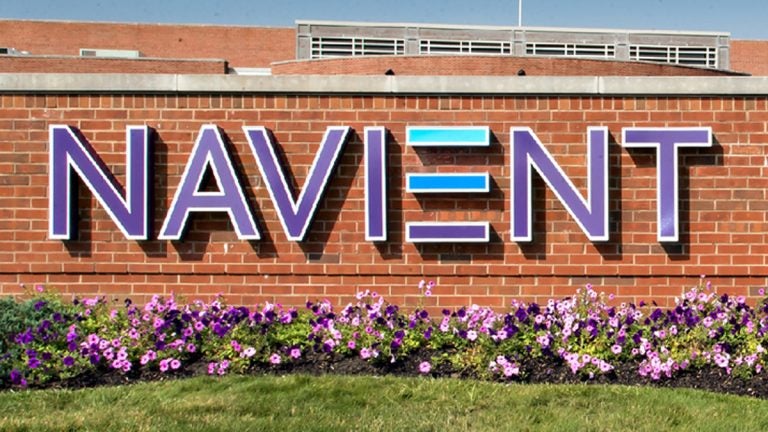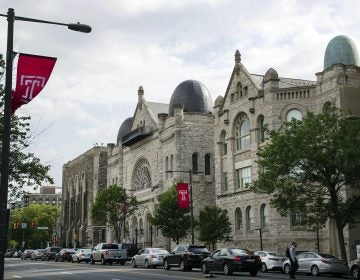Claiming predatory practices, Pa. attorney general sues student loan servicer Navient
Pennsylvania's attorney general is suing Navient, the country's largest student loan servicer.

(GLOBE NEWSWIRE/AP)
Pennsylvania’s attorney general is suing Navient, the country’s largest student loan servicer, claiming that it engaged in predatory lending by handing out tens of thousands of subprime loans bound to fail.
During the same period lenders were aggressively pushing the subprime mortgage loans that spawned the housing crisis in the years before 2007, Sallie Mae — now known as Navient — preyed on students seeking loans, the suit claimed. It offered a type of enticing loan that top company officials allegedly knew would eventually implode, yet they looked away and kept signing up more and more students.
The fact that borrowers were unlikely to ever repay the loans “was no secret” to Sallie Mae, lawyers in Harrisburg wrote in the suit.
School financial-aid officers, who maintained special relationships with the private lender, helped some of that business along, according to the suit. Federal regulators have since banned such conflicts of interest after government investigations revealed some school advisers were receiving kickbacks and other perks for promoting preferred lenders.
The regulations, however, did not start before the growth of these risky loans took off like a rocket ship.
About 706 of the subprime loans were extended to student borrowers in 2000. By 2006, the number grew by more than 54,000. Up to 87 percent of borrowers defaulted, more than double the default rate across all types of loans.
“They wanted someone to stand up to Navient and do something for them,” Pennsylvania Attorney General Josh Shapiro said in an interview Tuesday.”And at a time where the federal government is rolling back its protections for student loan holders, we’re stepping up to fill that breach to protect students, their parents and other loan-holders in Pennsylvania.”
Patricia Nash Christel, a Navient spokeswoman, called the allegations in the lawsuit “unfounded,” saying Shapiro filed the suit without ever reviewing the Navient accounts of Pennsylvania residents.
“We will vigorously defend our record in court and are confident we will prevail following an impartial review of the facts,” Nash Christel said in a statement.
Allegations include boast of ‘baited hook’
Government lawyers say Sallie Mae was aware the loans were trapping students under a mountain of debt. Even still, it did not stop supplying them because the program was a money-maker.
In a January 2007 email, Sallie Mae described its subprime loan program as a “baited hook” to bring more federally-backed student loan business its way, according to the suit.
The company, according to the suit, could absorb losses from its private loan program since it maintained a much wider, and more lucrative, portfolio of federal loans.
Officials at Sallie Mae loosened credit standards by ignoring borrowers’ credit histories and allowed them to finance education often at for-profit schools with poor graduation rates, the suit said.
When it came to servicing federal student loans, the suit claimed that employees now at the company known as Navient are actively undermining efforts to help students pay their loan debts.
According to the suit, officials at the servicing company discouraged borrowers from entering one of a number of affordable repayment plans offered by the federal government.
Instead, Navient created financial incentives for those customer-service representatives who steered borrowers into forbearance, a period of nonpayment granted to struggling borrowers, in which interest continues to build month by month.
Navient itself was not involved in the risky loan program and does not issue loans. But because Navient, in 2014, assumed Sallie Mae’s entire loan portfolio and liabilities, the company is now responsible for defending against accusations of sloppy loan practices described in this suit, in addition to similar lawsuits filed by top officials in Washington state and Illinois.
Navient maintains a major servicing center in Wilkes-Barre, Pennsylvania, from which borrowers around the country receive calls and mail about the status of their private and federal student loans. In January, the Consumer Financial Protection Bureau filed its own lawsuit alleging the company was making it harder for students to repay by doling out bad information to borrowers.
In April, a WHYY investigation revealed how federal officials have been increasingly hiring private debt-collection lawyers in Philadelphia and around the country to sue student loan borrowers who have not been able to pay back their federal loans. In some cases, the government has put borrowers’ homes on the line as pressure to pay up.
Many of the students who are fighting back against these suits have debt currently being serviced by Navient.
WHYY is your source for fact-based, in-depth journalism and information. As a nonprofit organization, we rely on financial support from readers like you. Please give today.




